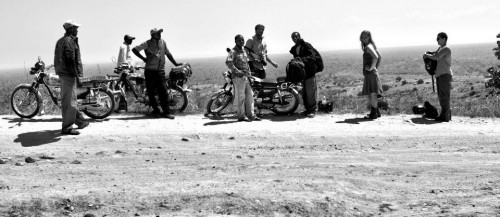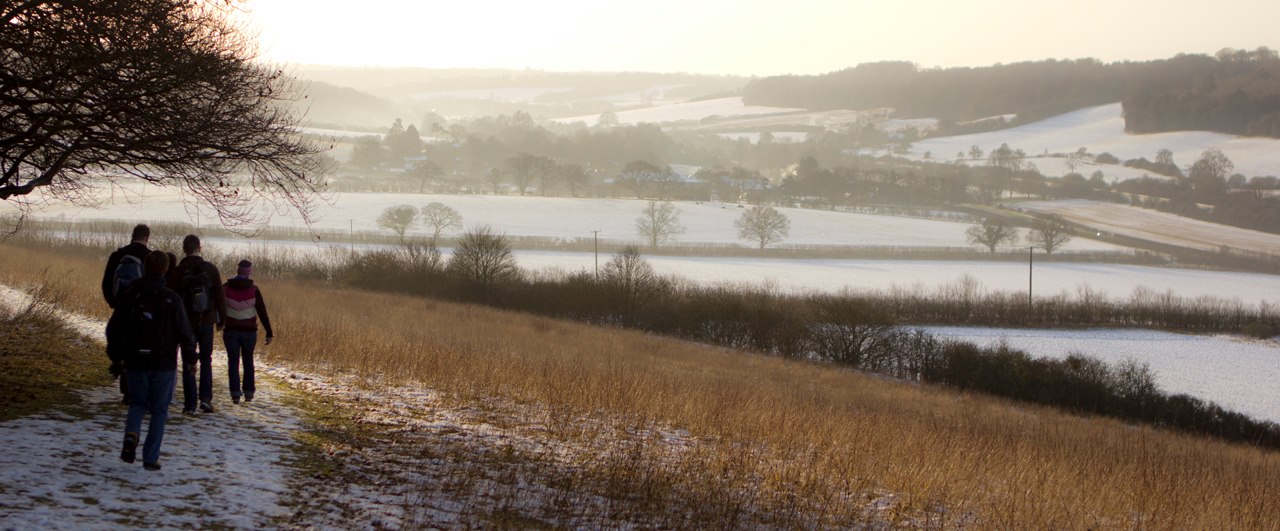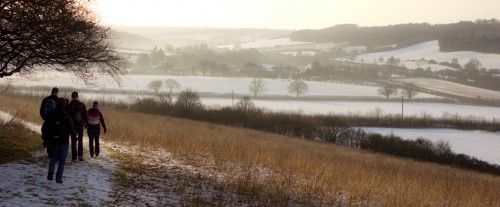For whatever strange reason, I seem to mostly write late at night. Sometimes, if I am so taken, I might sit and compose a post in the early evening, but never in the morning and almost never in daylight. With the exception, perhaps, of periods on the road in places where internet access sets with the sun. It’s a strange habit (I mean, when do you write?). But the ideas of ‘daylight’ and ‘day’ in England are ambiguous at best, and often have very little to do with each other.
Daytime here is often more of a dull, woolly twilight that never ends. And even when there is sun, there is something never quite right about it. A friend put it well when she pointed out that it’s something about the brightness of the light during an English winter that’s broken. It’s brighter than indoors, but wouldn’t hold a candle (so to speak) to an afternoon in the Karoo. But such as that sun is, when it appears, it’s sheer glee to be outdoors – something that I must do more of. Remind myself that this is a new place. A space that needs to be explored.
I can’t just live life in the college and its immediate surrounds. Comfortable as known spaces always are.
That said, my other excuse for being indoors has been thesis writing. Impending deadlines and constant work have meant that the finish line was surprisingly close last week and that with a little luck and a nod from my supervisor, I may have now actually passed it. If that happens, it’s time for submission and a break before learning 2.0 begins over in Germany. Which is a novel thought actually. With so much academic writing suddenly ending, and wide open spaces with no specific commitments now lying ahead, I feel like the proverbial deer in the headlights. One that has some work to do in regaining the ability to write unstructured, poetic words again. And stop using words like discourse and problematic.
My thesis was on media reporting about the 2011-12 famine in Somalia, looking at how certain kinds of stories can come to be the common definition of the situation (the famine was caused by drought, for example) and not others (the famine was caused by a raging conflict that denies people the security to earn an income and access food, say). It was also about other things – like asking why victims get photographed a whole bunch, but have their voices replaced by NGO and government spokespeople – but the stories part has been particularly foundational.
It’s also left me wondering a great deal about this thing we call ‘the power of stories’. Lots of writers – from the academic to the mystical – love to talk about stories as helping to structure how we perceive the world, but often leave the nuts and bolts of how that process works unsaid. Which is a pity, because those writing in the discipline of journalism (and, in some instances, travel writing) are routinely engaged in producing exactly these kinds of formative stories. Understanding the effects of the stories you write on how a place or a community comes to be known to your audience seems pretty important if you want to be able to exert any kind of control over that process.
So, yeah. Stories…
Taking it back to basics, because I’ve spent far too much time reading highfalutin’ language, we (that’s us humans) compose what we believe to be true about the world from a bundle of different sources. So if I ask you what it is like to go to Starbucks, for example, then you will likely turn first to your memories of previous trips there to tell me what is nice, what to order, and so on. That’s a fairly obvious case of you recalling what the place is like from your own, direct experience.
If I asked you what a specific branch was like, and it was one that you hadn’t been to before, then you would need to scan your memory more widely than your own experiences in order to give me an answer. Perhaps you know a friend who went to that branch. And they said it was terrible. It’s not a direct experience of your own, but it was the direct experience of someone in your immediate circle, and so you are relying – in a sense – on their story of the place to substitute for your own firsthand knowledge.
This is a different, second-hand kind of knowledge. If you feel like getting all Truman Show about it, you don’t actually have any proper evidence that the alternative Starbucks branch actually exists at all. The entire thing could simply be a fabrication. But because the story seemed credible, you believe it and hold onto it as a kind of ‘accrued truth’ that is open to change if more credible stories come along.
In the case of the Starbucks, it’s also possible that you will go to that branch yourself one day, and can then replace the story that you heard of the place (which would probably have been far less detailed than your own experience there) with your own, much richer and more authoritative version of it. But what if you never actually go to that Starbucks? Then all you have is the story, on whose authority you will tell others, as truth, what that Starbucks is like.
So it is with Starbucks, so it is with even more distant destinations. How do you know what is happening with the war in Mali at the moment? How do you know what Guam is like? Stories. That’s how.

The DRC, for example, told as travel, rather than humanitarian journalism, does a different kind of storytelling work.
Stories are a substitute for truth in the case of places we do not know for ourselves directly. Either because they are simply too remote (like Mali), or because they can’t be directly observed (like asking what is happening in country X’s political space). Where they are things that we will never come to know directly ourselves, the stories – and this is important – can be all we actually end up having. If they make us imagine certain truths about a place, then that truth becomes hegemonic. Without any other, different, stories it becomes literally impossible for a reader to imagine a different, or more nuanced truth. Often, they will be unaware that there is a more nuanced truth that needs to be imagined in the first place. Even if you know that a story is incomplete, how – in the absence of your own experience or other stories – would you begin to fill in the blanks?
Refugee camps are an instructive example. I’ve never been to one. I can only imagine, from the stories I’ve read, what the reality of places like Dadaab are like. And it’s a picture that is both grim and largely one-dimensional. Feeding stations, horrible stories and dying. Though individual stories about places like Dadaab that appear in the media carry different specific details (this person suffering, rather than that one), the overall impression is pretty consistent.
Then I met a journalist who had actually been there and – outside of a thousand word article – discussed his experience of the place. He pointed out that there was an Ethiopian restaurant there. And that Dadaab even has an inward migration of people who come looking for economic opportunities. Because you don’t set up a city of a million people without a large economy forming. Without markets and the opportunity for jobs and profit. Then, later, BBC published this piece about , among other things, Dadaab’s first millionaire.
All of a sudden, what I knew to be true about the place changed. Became more sophisticated. More nuanced.
Refugee camps are simply one example. For the travel writers, stories of all kinds of remote countries can be similarly monolithic. Who can know that Togo is not as you write it? Or when so many travellers to Thailand end up in Khaosan road, tiger temples or full moon parties, is it any wonder that so many stories reflect exotic monks, lazing in islands or hi-jinks with glowsticks? For the foreign correspondents and freelancers, similar logic often applies. Because it’s often safer to travel with the humanitarian agencies or the soldiers, those experiences are the ones that typically get written. There may be sound reasons why its hard to write the stories of Al Shabaab, the Taliban, Ansar Dine, or the thousands of people caught in a spectrum from abject victim to perpetrator. But the result is large silences. Huge gaps in understanding why militants fight, and what happens to everyone who isn’t a baddie or a victim.
As a storyteller, nuance, difference and variety matter. It’s not simply about writing the same kind of story better. It’s important to find wholly new kinds of tale to tell. Different kinds of subjects. Different kinds of worlds.
This variety is important because (as in the case of Starbucks) your story is one of many that may, for all intents and purposes, fill in as the facts that readers know about a place. Whether they consider acting on an issue, and equally importantly, how they decide to act on it, will depend on what facts and perspectives those stories have given them. If stories suggest Somalia can be fixed by food, then we must feed them. If stories suggest that justice is needed, then (though much more is required) it can be pursued.
Without the stories, action towards distant places or structural problems cannot even be contemplated. With them, we are able to contemplate only within the bounds of the reality they represent. They are, to pull out that tired maxim, necessary, even if insufficient conditions for action towards the things in the world that we cannot know directly.
So, when next you write, remember that you are passing on a truth, of a kind. The more it contributes to understanding some place, or some thing in more detail, the more you are making it possible for someone else to imagine those nuances. And perhaps even to act on that imagination. To dream about it, to be outraged, or simply to inflect their own stories in turn.
And that’s a pretty amazing possibility.


